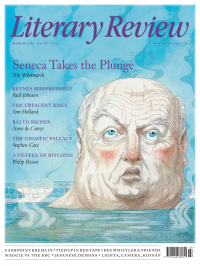Suzi Feay
Papering over the Cracks
Widows and Orphans
By Michael Arditti
Arcadia 350pp £14.99
Blended families are complicated enough in real life; in fiction they pose significant challenges. When a minor character announces, ‘My daughter’s ex-husband was a fraudster and a thief’, even the most alert reader might have to stop and check that they know who’s who. Michael Arditti’s new novel is not literally full of widows and orphans, but it is pervaded by a sense of adriftness and fracture.
Duncan Neville is the editor of the Mercury, a struggling local newspaper that has belonged to his family for almost 150 years. The glory days of lavish advertising and generous salaries long past, he has to live above the shop, in the small flat his father reserved for extramarital trysts.

Sign Up to our newsletter
Receive free articles, highlights from the archive, news, details of prizes, and much more.@Lit_Review
Follow Literary Review on Twitter
Twitter Feed
Russia’s recent efforts to destabilise the Baltic states have increased enthusiasm for the EU in these places. With Euroscepticism growing in countries like France and Germany, @owenmatth wonders whether Europe’s salvation will come from its periphery.
Owen Matthews - Sea of Troubles
Owen Matthews: Sea of Troubles - Baltic: The Future of Europe by Oliver Moody
literaryreview.co.uk
Many laptop workers will find Vincenzo Latronico’s PERFECTION sends shivers of uncomfortable recognition down their spine. I wrote about why for @Lit_Review
https://literaryreview.co.uk/hashtag-living
An insightful review by @DanielB89913888 of In Covid’s Wake (Macedo & Lee, @PrincetonUPress).
Paraphrasing: left-leaning authors critique the Covid response using right-wing arguments. A fascinating read.
via @Lit_Review